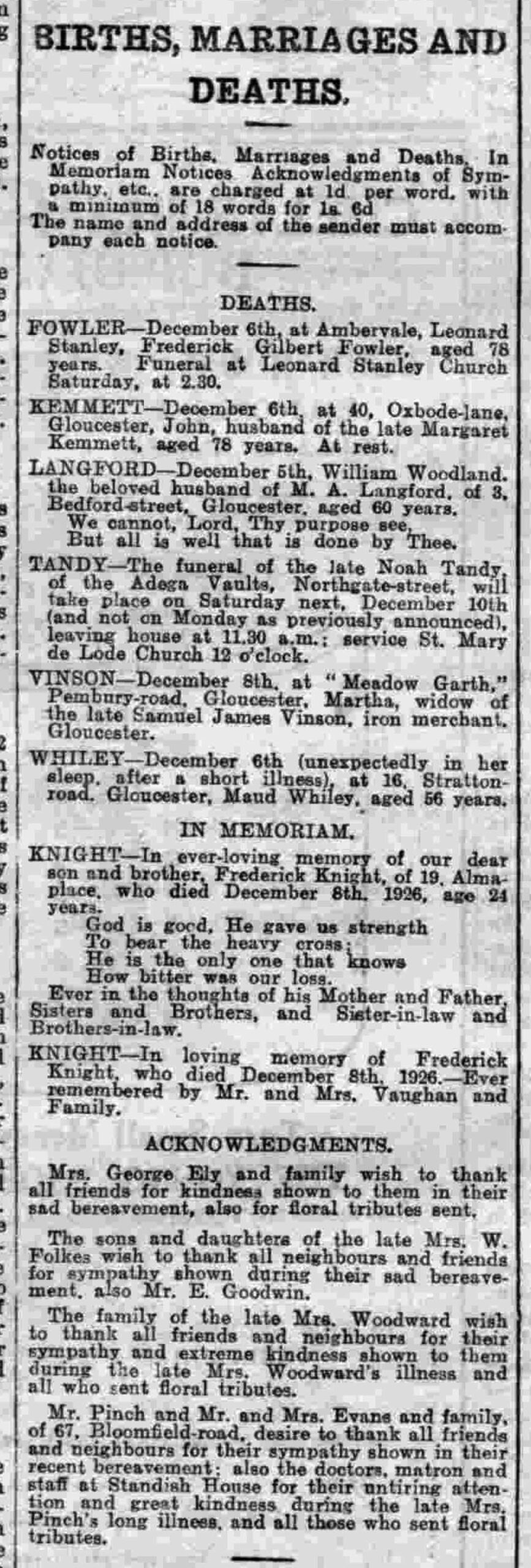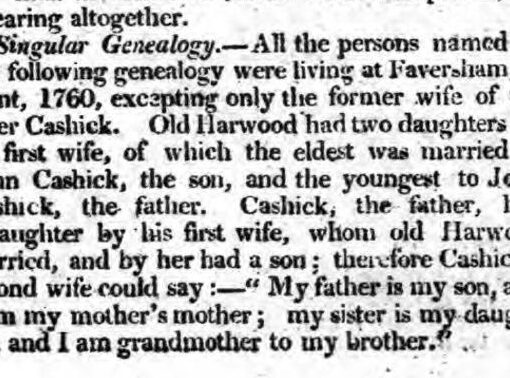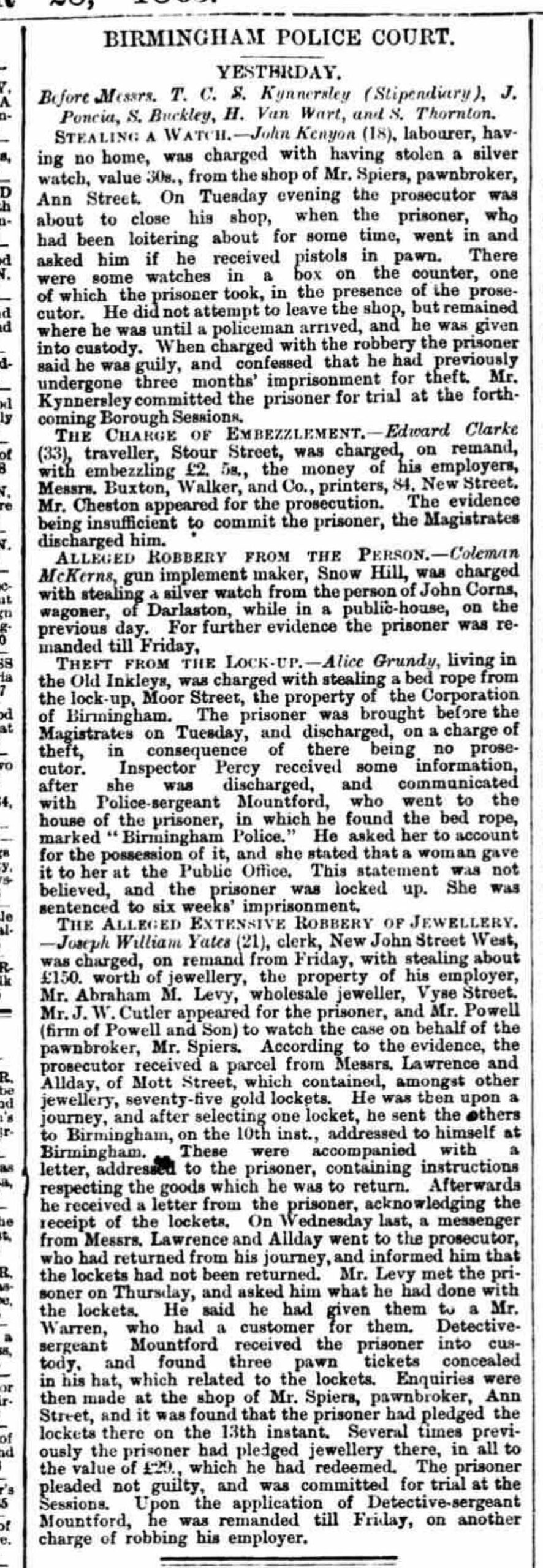Leamington Spa Courier – Saturday 17 September 1836
LOCAL INTELLIGENCE.
Commitments to the County Gaol:—By F. Lloyd, Esq.,
 Samuel Fantham, charged with stealing, at Birmingham, a double-barrel gun, the property of Edward Powell.
Samuel Fantham, charged with stealing, at Birmingham, a double-barrel gun, the property of Edward Powell.
—John Smith, charged with stealing, at Aston, a five-pound note, a sovereign, and three half sovereigns in gold, the property of Jabez Smart Allen.
—Thomas Bushell, charged with stealing, at Aston, two half-crowns, fourteen shillings, sixteen sixpences in silver, and seven penny pieces and twenty halfpence in copper, and three ear drops, the goods and monies of Ann Wood.
—By J. Scholefield and J. T. Lawrence, Esq., Isaac Gandy, charged with assaulting Elizabeth Hart, at Birmingham; to pay £5, or be imprisoned two months.
—By J. Conolly, W. Collins, and C. Lamb, Esqs., Thomas Burford, charged with stealing, at Warwick, two silver spoons and a knife and fork, the property of John Woodward; also with stealing, at Warwick, a knife, the property of Wm. Mellows.
—By J. T. Lawrence, Esq., Francis Wilday, charged with stealing, at Edgbaston, a shovel and pick, the property of Wm. Read.
—Thomas Suker, charged with stealing, at Aston, a pocket handkerchief, the property of George Chambers.
—Margaret Brown, charged with stealing, at Birmingham, a piece of lamb, and a piece of mutton, the property of Wm. Shorthouse; also with stealing 4lb of veal, the property of Wm. Watton.
—John Bagley, charged with stealing, at Birmingham, 3 lbs of beef, the property of Richard Robins.
—Margaret Matthews and Sarah Hubble, charged with stealing, at Birmingham, from the person of Wm. Bradbury, seventeen sovereigns, his property.
—By J. Webster and J. T. Lawrence, Esq., Thomas Foyle, charged with stealing, at Birmingham, 5½ lbs of iron, the property of Benjamin Sarson.
—By the Right Hon. Lord Viscount Lifford, Robert Tedd and Mark Hewett, charged with stealing, at Nuneaton, a goose, the property of Edward Bromwich.
—By F. Lloyd and J. T. Lawrence, Esq., John Gardner, charged with assaulting Wm. Minchin, at Birmingham; to pay 20s., with 6s. 6d. costs, or be imprisoned one calendar month.
—John Gateley, charged with assaulting John Brown, at Birmingham; to pay 40s., with 6s. 6d. costs, or be imprisoned one calendar month.
—Wm. Robinson, charged with assaulting Magnus Saunders, at Birmingham; to pay 20s., with 6s. 6d. costs, or be imprisoned one calendar month; also with assaulting Daniel Saunderson, at Birmingham; to pay £2, with 6s. 6d. costs, or be further imprisoned one calendar month.
—By J. Webster and J. T. Lawrence, Esq., John Williamson, charged with assaulting Thomas Alluritt, at Birmingham; to pay 40s., with 9s. 6d. costs, or be imprisoned two months.
Commitments to the County Gaol:—By Rev. J. Bondier,
Thomas Rouse, charged with stealing, at Leamington Priors, a watch, the property of E. Ivens.
—By Revs. E. Webb and F. Palmer, Isaac Smith and George Webb, charged with assaulting Thomas Wright, at Alcester; to pay the sum of £5 each, or be imprisoned two calendar months; the said Isaac Smith to find sureties.
—By W. Collins and C. Lamb, Esqs., Charles Heritage, charged with assaulting Wm. Muckley, at Warwick; to find sureties for keeping the peace for twelve months.
—By F. Lloyd, Esq., George Spiers, charged with stealing, at Birmingham, a handkerchief, the property of Samuel Henningham.
—Samuel Porter, charged with stealing, at Birmingham, a coat, a pair of trousers, a waistcoat, and two neckerchiefs, the goods of Giles Clift.
—Harriet Eliza James, charged with stealing, from the person of Samuel Warwick, at Birmingham, a leather purse, 5 half-crowns, 16 shillings, 3 sixpences, and 5 pence, the monies of the said Samuel Warwick.
—Wm. Jones, charged with stealing, at Birmingham, a shovel, the property of John Baxter.
—Mary Betts, charged with stealing, from the person of Henry Thomas, a watch, a purse, and 11 shillings, his property.
—Richard Bull, charged with stealing, at Birmingham, 54 lbs of brass, the property of James Barlow, his master.
—Mary Nicholls, charged with embezzling, at Birmingham, £1. 6s., the monies of her master.
—By R. Spooner, Esq., Thomas Miles and James Barker, charged with driving a horse and cart too fast along Temple-row, Birmingham; to pay £5 each, with 9s. 6d. costs, or be imprisoned two calendar months.
—By J. F. Ledsam and J. Webster, Esq., Wm. Aston and John Asson, charged with assaulting Wm. Mincher, at Birmingham; to pay 20s., with 13s. 6d. costs each, or be imprisoned one calendar month.
—By J. F. Ledsam, Esq., and the Rev. W. R. Bedford, Charles Denham, charged with assaulting Ann Whitehouse, at Birmingham; to pay 5s., or be imprisoned two calendar months.
—By J. F. Ledsam, Esq., Mary Ann Chapman, charged with stealing, at Birmingham, a silk handkerchief, the property of John Hargrove.
—Wm. Cumberledge, charged with stealing, at Birmingham, 53 lbs of cheese, the property of Edward Dudley.
—By R. Spooner, Esq., Abel Birch, charged with stealing, at Birmingham, a promissory note of £5, the property of Charles Webb.
Context and Historical Significance
This newspaper article provides an account of individuals committed to the County Gaol (prison) for various crimes in different locations, particularly Birmingham, Aston, Warwick, and Nuneaton. The charges range from theft of personal property (e.g., money, food, watches) to physical assault, embezzlement, and disorderly conduct.
During the early 19th century, the criminal justice system in England was highly structured but often harsh. The punishments outlined—monetary fines or imprisonment—were common for crimes such as theft and assault. The legal system relied heavily on local magistrates, who issued verdicts and determined sentences.
Legal Implications and Consequences
- Theft: Many accused individuals were charged with stealing small valuables (money, clothing, meat, iron, brass). Petty theft was a serious crime, and punishments ranged from fines to imprisonment.
- Assault: Fines were imposed for physical altercations, with imprisonment for those unable to pay.
- Embezzlement: Mary Nicholls was charged with embezzlement, a serious offense that could lead to harsher penalties.
- Traffic Violations: Thomas Miles and James Barker were fined for driving a horse and cart too fast, showing early law enforcement against reckless driving.
Use for Researchers
Historians and genealogists can use this article to:
- Track individuals through criminal records.
- Understand social conditions and crime trends.
- Study judicial practices in 19th-century England.
- Identify property ownership and local economic conditions.
Further research could involve locating court records, prison records, or census data to expand on these cases.
The History of The Leamington Spa Courier
Founding and Early Development (1828–1830s)

The Leamington Spa Courier was the first newspaper established in Leamington Spa, Warwickshire. It was founded in 1828 as a weekly broadsheet by John Fairfax and James Sharp Senior. The paper was launched during a time of significant local growth, as Leamington was emerging as a fashionable spa town. The Courier aimed to serve the local readership by covering news relevant to the region’s social, economic, and political developments.
However, ideological differences between the two founders led to their separation. Fairfax, a staunch Liberal, decided to part ways with Sharp and subsequently founded the Leamington Chronicle, a competing publication. Despite his efforts, the Chronicle failed to achieve lasting success. Fairfax later emigrated to Australia, where he purchased The Sydney Morning Herald, which went on to become one of Australia’s most influential newspapers.
Ownership under George Christopher Liebenrood
Following Fairfax’s departure, The Leamington Spa Courier was acquired by George Christopher Liebenrood. Under his leadership, the newspaper aligned itself with Conservative political values, distinguishing itself as a strong advocate for the Church of England. The publication catered primarily to readers with agricultural, commercial, and manufacturing interests, reflecting the economic priorities of the region. At the time, political alignment in the press was common, and newspapers played a crucial role in influencing public opinion and local governance.
Joseph Glover and His Legacy (Mid-19th to Early 20th Century)
Ownership of the Courier later passed to Joseph Glover, a prominent bookseller and printer in Leamington. Glover significantly expanded the newspaper’s influence and became a highly respected figure in the town. His contributions extended beyond journalism—he was appointed a Justice of the Peace in 1876 and was later nominated for the position of Mayor in 1891, though he declined the role.
Beyond local politics, Glover played an active part in the newspaper industry on a broader scale. He was elected President of the Provincial Newspaper Society in 1870 and later served as Chairman of the Press Association in 1874, reflecting his stature within the British press. His leadership helped solidify the Courier’s reputation as a well-respected regional publication.
Frank Glover’s Tenure and the Glover Family’s Influence
Control of the newspaper eventually passed to Joseph Glover’s son, Frank Glover. Frank married Ethel Harraden, a noted musical composer, further cementing the family’s cultural ties. He continued his father’s legacy, overseeing the paper’s editorial and commercial operations. By the time of his death in 1929, he was Chairman and Managing Director of Leamington Spa Courier Ltd.
Historical Significance and Impact
The Leamington Spa Courier was not merely a local newspaper; it played a significant role in shaping public discourse in Warwickshire. The paper reflected the social and political landscape of the era, from its early days under Fairfax’s Liberal influence to its long-standing Conservative stance under subsequent owners.
Throughout the 19th and early 20th centuries, local newspapers were instrumental in shaping political and economic narratives. They provided a voice for various societal groups, documented regional events, and held local authorities accountable. In the case of the Courier, its Conservative and pro-Church of England editorial stance would have appealed to landowners, businesspeople, and clergy, making it a crucial part of the town’s establishment.
Additionally, figures like Joseph and Frank Glover exemplified the power and influence of the provincial press. Their roles in national newspaper organisations such as the Press Association highlight how regional journalism intersected with the broader media landscape of Victorian and Edwardian Britain.
From theft of meat & money to assaults & fast horse-cart driving—this 1836 report details justice in Victorian Warwickshire. Fines, imprisonment & public shame awaited offenders. #LeamingtonSpa #CrimeHistory #VictorianJustice #OldNewspapers #History




